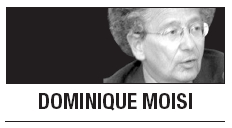[Dominique Moisi] Europe’s anti-Europeans look to power
By Yu Kun-haPublished : Nov. 24, 2013 - 19:13
PARIS ― In 2005, two founding members of the European Union, France and the Netherlands, rejected by popular referendum the EU’s proposed constitutional treaty. Two far-right parties from these countries, the French National Front and the Dutch Freedom Party, have now formed an alliance ahead of the European Parliament elections in May 2014. They hope to attract likeminded parties in other EU countries and form a parliamentary bloc powerful enough to slay “the monster of Europe,” as Geert Wilders, the Freedom Party’s leader, calls the EU.
 It is no accident that France and the Netherlands have taken the lead in this sordid venture. Both countries are in the midst of a deep identity crisis that is mutating into disdain for Europe, foreigners, migrants, and all who represent the “other.” And both countries are experiencing an increase in popular suspicion toward traditional political elites.
It is no accident that France and the Netherlands have taken the lead in this sordid venture. Both countries are in the midst of a deep identity crisis that is mutating into disdain for Europe, foreigners, migrants, and all who represent the “other.” And both countries are experiencing an increase in popular suspicion toward traditional political elites.
In this environment, the upcoming European Parliament elections seem tailor-made for extremist parties, with recent public-opinion polls suggesting that the National Front will come out on top in France. European elections leave most citizens indifferent, which translates into low voter turnout ― except among those who, defined by what they oppose, wish to express their anger and frustration with the status quo.
Marine Le Pen, the National Front’s leader, is shrewd and efficient, running on a straightforward message: “Europe is against the people, so the people must mobilize against Europe.” With her semblance of moderation, she is far more appealing than her father and former party leader, Jean-Marie Le Pen. Her strategy is to enter the mainstream of French politics by shedding all traces of past anti-Semitism, thereby turning the National Front into a seemingly legitimate alternative to a decadent traditional right, which has suffered a prolonged bout of infighting since Nicolas Sarkozy’s defeat in the 2012 presidential election.
In the Netherlands, Wilders ― more a one-man show than the leader of a real party ― has already been in government, thereby providing a veneer of legitimacy to Le Pen simply by forming an alliance with her. Interestingly, the main Danish and British anti-European parties have refused to follow suit, refusing to enter into a pact with a party that was and probably remains anti-Semitic at its core.
And yet what ultimately unites Europe’s far-right parties is similar to what underlies the Tea Party’s rise within America’s Republican Party: covert racism and xenophobia. Though the Tea Party’s followers ― a group that one early opinion poll identified as 89 percent white and just 1 percent black ― claim to oppose government spending above all else, they accept government help for themselves. What they cannot accept is a black president and government spending on “others.”
Likewise, though Europe’s populists use their opposition to “Brussels” as a rallying flag, their ideology retains the atavism that motivated their forebears. Today’s far-right forces may be more anti-Muslim than anti-Semitic ― Wilders may even be sincerely pro-Israel ― but they maintain the anti-humanist, cynical, and racist worldview of their predecessors in the 1930’s.
Of course, a country like France is not returning to the politics of the 1930s, if only because the memories of the country’s military and moral collapse in 1940 have not faded. But the vicious racist attacks on the justice minister, Christiane Taubira, who is black, would have been unthinkable in past decades. And, throughout Europe, the loss of taboos and the belief that anything can be said ― and anyone insulted ― has led to an increase in racist incidents that are only superficially isolated.
Europe is not about to turn fascist; yet it would be dangerous to ignore that it is going astray, or to attribute recent developments solely to economic hard times and high unemployment. More fundamental causes, political as well as ethical, are at work.
For example, Germany fares better than other European countries in its resistance to populism, not only because its economy is strong and its history constitutes a form of vaccination. Germans can also thank the mettle and competence of their political leaders, including Chancellor Angela Merkel and her predecessor, Gerhard Schrder.
The best response to today’s unholy alliance of populist/racist parties is courage, determination, and clarity of position. Any alliance by mainstream conservative parties with far-right forces will turn out to be a guarantee of defeat ― moral as well as political. That was true in Europe’s past, just as it is true for America’s Republicans today. Sometimes no spoon is long enough to sup with the devil.
By Dominique Moisi
Dominique Moisi, a professor at L’Institut d’tudes politiques de Paris (Sciences Po), is senior adviser at the French Institute for International Affairs (IFRI). He is currently a visiting professor at King’s College London. ― Ed.
(Project Syndicate)
 It is no accident that France and the Netherlands have taken the lead in this sordid venture. Both countries are in the midst of a deep identity crisis that is mutating into disdain for Europe, foreigners, migrants, and all who represent the “other.” And both countries are experiencing an increase in popular suspicion toward traditional political elites.
It is no accident that France and the Netherlands have taken the lead in this sordid venture. Both countries are in the midst of a deep identity crisis that is mutating into disdain for Europe, foreigners, migrants, and all who represent the “other.” And both countries are experiencing an increase in popular suspicion toward traditional political elites.In this environment, the upcoming European Parliament elections seem tailor-made for extremist parties, with recent public-opinion polls suggesting that the National Front will come out on top in France. European elections leave most citizens indifferent, which translates into low voter turnout ― except among those who, defined by what they oppose, wish to express their anger and frustration with the status quo.
Marine Le Pen, the National Front’s leader, is shrewd and efficient, running on a straightforward message: “Europe is against the people, so the people must mobilize against Europe.” With her semblance of moderation, she is far more appealing than her father and former party leader, Jean-Marie Le Pen. Her strategy is to enter the mainstream of French politics by shedding all traces of past anti-Semitism, thereby turning the National Front into a seemingly legitimate alternative to a decadent traditional right, which has suffered a prolonged bout of infighting since Nicolas Sarkozy’s defeat in the 2012 presidential election.
In the Netherlands, Wilders ― more a one-man show than the leader of a real party ― has already been in government, thereby providing a veneer of legitimacy to Le Pen simply by forming an alliance with her. Interestingly, the main Danish and British anti-European parties have refused to follow suit, refusing to enter into a pact with a party that was and probably remains anti-Semitic at its core.
And yet what ultimately unites Europe’s far-right parties is similar to what underlies the Tea Party’s rise within America’s Republican Party: covert racism and xenophobia. Though the Tea Party’s followers ― a group that one early opinion poll identified as 89 percent white and just 1 percent black ― claim to oppose government spending above all else, they accept government help for themselves. What they cannot accept is a black president and government spending on “others.”
Likewise, though Europe’s populists use their opposition to “Brussels” as a rallying flag, their ideology retains the atavism that motivated their forebears. Today’s far-right forces may be more anti-Muslim than anti-Semitic ― Wilders may even be sincerely pro-Israel ― but they maintain the anti-humanist, cynical, and racist worldview of their predecessors in the 1930’s.
Of course, a country like France is not returning to the politics of the 1930s, if only because the memories of the country’s military and moral collapse in 1940 have not faded. But the vicious racist attacks on the justice minister, Christiane Taubira, who is black, would have been unthinkable in past decades. And, throughout Europe, the loss of taboos and the belief that anything can be said ― and anyone insulted ― has led to an increase in racist incidents that are only superficially isolated.
Europe is not about to turn fascist; yet it would be dangerous to ignore that it is going astray, or to attribute recent developments solely to economic hard times and high unemployment. More fundamental causes, political as well as ethical, are at work.
For example, Germany fares better than other European countries in its resistance to populism, not only because its economy is strong and its history constitutes a form of vaccination. Germans can also thank the mettle and competence of their political leaders, including Chancellor Angela Merkel and her predecessor, Gerhard Schrder.
The best response to today’s unholy alliance of populist/racist parties is courage, determination, and clarity of position. Any alliance by mainstream conservative parties with far-right forces will turn out to be a guarantee of defeat ― moral as well as political. That was true in Europe’s past, just as it is true for America’s Republicans today. Sometimes no spoon is long enough to sup with the devil.
By Dominique Moisi
Dominique Moisi, a professor at L’Institut d’tudes politiques de Paris (Sciences Po), is senior adviser at the French Institute for International Affairs (IFRI). He is currently a visiting professor at King’s College London. ― Ed.
(Project Syndicate)









![[From the Scene] Monks, Buddhists hail return of remains of Buddhas](http://res.heraldm.com/phpwas/restmb_idxmake.php?idx=644&simg=/content/image/2024/04/19/20240419050617_0.jpg&u=20240419175937)





![[From the Scene] Monks, Buddhists hail return of remains of Buddhas](http://res.heraldm.com/phpwas/restmb_idxmake.php?idx=652&simg=/content/image/2024/04/19/20240419050617_0.jpg&u=20240419175937)

![[KH Explains] Hyundai's full hybrid edge to pay off amid slow transition to pure EVs](http://res.heraldm.com/phpwas/restmb_idxmake.php?idx=652&simg=/content/image/2024/04/18/20240418050645_0.jpg&u=20240419100350)

![[Today’s K-pop] Illit drops debut single remix](http://res.heraldm.com/phpwas/restmb_idxmake.php?idx=642&simg=/content/image/2024/04/19/20240419050612_0.jpg&u=)